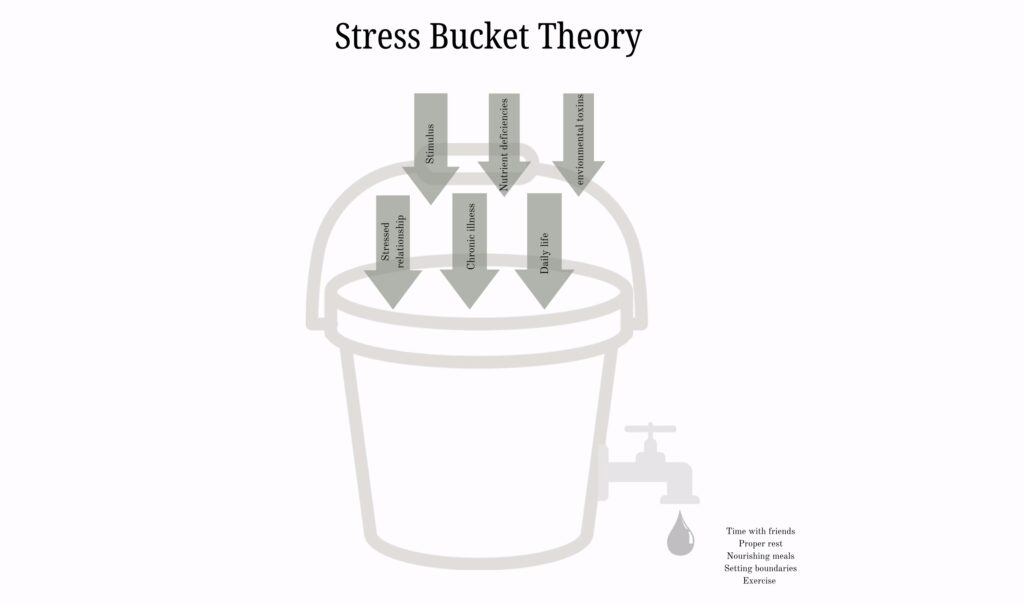The term adrenal fatigue was coined to represent the state of exhaustion our bodies go through after a significant period of chronic stress. The idea is that your stress handling system (like adrenals) gets so overworked that it wears out and stops responding adequately. I like this term, while also understand it is a little misleading. I think the term Adrenal Fatigue women can easily identify with. However the new term HPA axis dysreguylation… well… I don’t think that one will catch on as well. These two terms are representing the same condition in the body after significant chronic stress. All hormones need proper communication streams to respond adequately. Kind of like that old game of Chinese telephone, remember? So what exactly is going on? And why is adrenal health so important for the wired and tired?
What is the HPA Axis?
The Hypothalamic-Pituitary-Adrenal (HPA) Axis is a neuroendocrine system that controls the body’s stress response. It consists of three key players:
- Hypothalamus (in the brain) – Detects stress and signals the pituitary gland.
- Pituitary gland – Releases adrenocorticotropic hormone (ACTH).
- Adrenal glands – Respond by producing cortisol, the body’s main stress hormone.
This system is designed to help us cope with stress by mobilizing energy, increasing alertness, and adjusting physiological processes. But when the HPA axis is overworked due to chronic stress, it leads to dysfunction—resulting in that relentless cycle of feeling both tired and wired.
What is Adrenal Fatigue?
Adrenal fatigue is a term used to describe a state of chronic stress and exhaustion caused by prolonged activation of the body’s stress response system. Your adrenal glands, produce hormones like cortisol and adrenaline to help you respond to stress. However, when stress becomes constant, your adrenal glands may struggle to keep up, leading to dysregulation of these hormones. There’s that dysregulation word again. Think of that boy who cried wolf…
People experiencing adrenal fatigue often describe feeling:
- Tired and wired
- Brain fog
- Unrelenting fatigue
- Cravings for salt and sugar
- Mood swings and anxiety
- Midday crashes
While adrenal fatigue isn’t an officially recognized medical diagnosis (although many functional medicine practitioners will recognize it), it is commonly identified by patterns of chronic stress and exhaustion.
Signs include:
- Difficulty getting out of bed, even after a full night’s sleep.
- Feeling reliant on caffeine or sugar to function.
- Increased sensitivity to stress, with minor frustrations feeling overwhelming.
- Frequent colds or slow recovery from illness due to weakened immunity.
- Dizzy spells when standing up too quickly (such a minor body stress- why can’t you handle it?).
The term itself was causing some conflict in the holistic world because the adrenals never actually wear out, and stop functioning. This is why it has been renamed (more appropriately) to HPA axis disfunction. If you hear the two terms- they’re referencing the same thing.
Related: Drink this drink to handle your stress better

Why Do You Feel Tired and Wired at the Same Time?
Chronic stress, whether from lifestyle, diet, or emotional strain, disrupts the normal function of the HPA axis. Here’s how:
- Blood Sugar Instability – When blood sugar spikes and crashes throughout the day (often due to poor diet or skipping meals), your body perceives this as stress. In response, it releases cortisol and adrenaline to keep you going. Over time, your body relies on stress hormones instead of proper fuel, leading to metabolic exhaustion.
- Fight-or-Flight Mode Overload – When stress is constant (whether from work, family, or unresolved anxiety), your body is permanently stuck in fight-or-flight mode. This means cortisol and adrenaline are always circulating, keeping you alert but exhausted.
- Gut Permeability & Inflammation – Chronic stress weakens the gut lining, allowing undigested food particles and toxins to enter the bloodstream. This triggers inflammation, further stimulating the stress response and creating a vicious cycle of gut issues, food intolerances, and more stress.
- Cortisol and Sleep Disruptions – Too much cortisol, especially in the evening, can sabotage sleep. You may feel exhausted all day but unable to unwind at night, leading to poor-quality rest and even higher stress hormone levels the next day.
- Mineral Depletion – Stress rapidly depletes essential nutrients like magnesium, potassium, and sodium, making recovery even harder. Without these minerals, your body struggles to regulate stress and energy levels, contributing to the constant feeling of depletion.
Related: Are you a stressed out sugar burner?
The Stress Bucket Theory
A helpful way to visualize this is through the stress bucket theory. Imagine your body as a bucket. Every stressor—poor diet, intense exercise, lack of sleep, work pressure, family obligations—fills the bucket. If you don’t have proper outlets (like rest, nutrition, and stress management), the bucket overflows, leading to burnout and breakdown.
What’s Filling Your Stress Bucket?
- Chronic illness
- Parenting demands
- Over-exercising (e.g., intense cardio, HIIT workouts)
- Blood sugar crashes
- Nutrient deficiencies
- Environmental toxins
- Too much caffeine
When the bucket overflows, dysfunction sets in, leaving you stuck in survival mode. Also, be aware that every person has a different size stress bucket. For example, my husbands and way larger than mine and mine seems to be overflowing quite quickly. The change happens when we recognize this and the symptoms of being overloading and start eliminating these stressor within reason.
Related: Self care for depression: 10 things you need to try

Ok, But Now What?
Besides all the science behind it- what can you actually do? The steps to address are both lifestyle and diet related.
1. Balance Blood Sugar
- Eat protein-rich meals (at least 30g per meal).
- Avoid naked carbs (always pair with protein, fat, or fiber).
- Reduce sugar and refined carbs.
- Eat before coffee in the morning.
- Take a short walk after meals to stabilize glucose levels.
2. Prioritize Stress Management
- Reduce high-intensity workouts if they leave you drained.
- Try gentle movement like walking, yoga, or strength training.
- Schedule restorative activities (reading, meditation, deep breathing).
- Say no to unnecessary stressors.
3. Replenish Lost Nutrients
- Consider adrenal cocktails (potassium, sodium, vitamin C) to restore mineral balance.
- Eat mineral-rich foods like bone broth, leafy greens, and sea salt.
- Support digestion to absorb nutrients better.
4. Improve Sleep Quality
- Set a consistent bedtime and wake time.
- Avoid screens and stimulants before bed.
- Use magnesium or herbal teas to relax in the evening.
Related: The chronic stress and poor sleep cycle: How to fix it
Final Thoughts
The HPA axis is designed to protect you, but in today’s world it often becomes overburdened. If you’re stuck in the tired and wired cycle, it’s a sign that your stress response system is struggling. Healing takes time, but by balancing blood sugar, reducing stress, replenishing minerals, and improving sleep, you can restore your body’s natural rhythm and finally feel like yourself again.
If you want a partner to help cut through the nutrition noise and carve out the exact steps you need to recover from adrenal fatigue, let’s chat! Book a free consultation with me, and let’s create a plan that works for your body and lifestyle.
Your health doesn’t have to feel like a struggle. Let’s simplify it together.
*This post contains affiliate links, which means I may receive a small commission at no extra cost to you. I do not recommend products that I have not personally vetted.*
Save for later!


